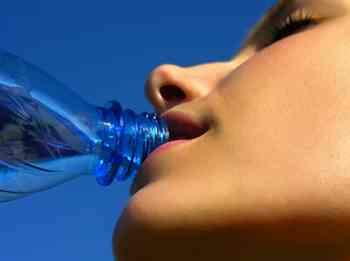- MENU
- HOME
- SEARCH
- WORLD
- MAIN
- AFRICA
- ASIA
- BALKANS
- EUROPE
- LATIN AMERICA
- MIDDLE EAST
- United Kingdom
- United States
- Argentina
- Australia
- Austria
- Benelux
- Brazil
- Canada
- China
- France
- Germany
- Greece
- Hungary
- India
- Indonesia
- Ireland
- Israel
- Italy
- Japan
- Korea
- Mexico
- New Zealand
- Pakistan
- Philippines
- Poland
- Russia
- South Africa
- Spain
- Taiwan
- Turkey
- USA
- BUSINESS
- WEALTH
- STOCKS
- TECH
- HEALTH
- LIFESTYLE
- ENTERTAINMENT
- SPORTS
- RSS
- iHaveNet.com: Health
Harvard Health Letters

Maintaining your body's fluid level helps fight overheating
Harvard Health Letters
Play it safe in hot, humid weather -- it can overheat the heart.
The human body is built for heat. It works best at an internal temperature of 98 degrees F and has intricate mechanisms to maintain that temperature. Yet hot weather, especially those triple-H days -- hazy, hot, and humid -- can strain the heart and the body.
Your cells produce heat in the process of converting sugar to energy. When the air temperature rises, your body doesn't have the option of generating less heat. You can shed clothes, but you can't get past your birthday suit. That leaves two main ways to offload heat: radiation and evaporation.
As things heat up, temperature sensors in your body tell blood vessels in the skin to relax and accept more blood. This peripheral blood flow radiates heat to the cooler skin, which passes it on to the air. But this solution no longer works when the air temperature approaches body temperature.
Sweating is another way of self-cooling. It uses heat from the body to turn liquid sweat into water vapor (by evaporation). Evaporating just 2 teaspoons of sweat could cool your bloodstream by two degrees. Sweating works well on dry days, but as the humidity climbs above 75 percent or so the amount of water in the air makes evaporation increasingly difficult.
HEAT AND THE HEART
Radiation and sweating each put pressure on the heart. Rerouting blood to the skin forces the heart to work harder. On a hot day, it may move four times as much blood as it does on a cool day. Sweating can steal minerals from the bloodstream that are needed to maintain a healthy fluid balance.
These stresses pass unnoticed in healthy people. But they can cause trouble in those with cholesterol-clogged arteries or cardiac muscle damaged by a heart attack or weakened by heart disease. Hot weather can be problematic for people taking a beta blocker or diuretic (water pill), or those who have Parkinson's disease, diabetes, a stroke, or another condition that can dull the brain's response to dehydration. It also tends to worsen conditions like heart failure, emphysema, or kidney failure.
BEAT THE HEAT
Common sense and a bit of vigilance can help you weather hot, humid days.
Find your cool
Chilled air is the best way to beat the heat. If you don't have an air conditioner, spend an hour or two in a movie theater, at a store, or with an air-conditioned neighbor. A cool shower or bath, or putting a cold, wet cloth or ice pack under your arms or on your groin can also help. A fan can speed evaporation, but only if the air is cooler than you are.
Drink up
Maintaining your body's fluid level helps fight overheating. Unfortunately, this isn't easy for everyone. Stomach or bowel problems, a faulty thirst signal, diuretics, physical activity, or low fluid intake can all contribute to dehydration. On dangerously hot and humid days, try downing a glass of water every hour. (If you have heart failure, check with your doctor or nurse first.) Go easy on sugary soda and full-strength fruit juice since they slow the movement of water from the digestive system to the bloodstream. Cut back on caffeinated beverages and alcohol, or skip them altogether, because they can cause or amplify dehydration.
Slow down
Try not to exercise or do other physical activity when the air temperature and humidity are high. Evening and early morning are best. If you do exercise, drink more healthful beverages than usual.
Eat light
Choose smaller meals that don't make your digestive system work as hard. Cold soups, salads, and fruits can satisfy your hunger and give you extra fluid.
Harvard Heart Letter
Available at Amazon.com:
Copyright © U.S. News and World Report. All rights reserved.
AGING | ALTERNATIVE | AILMENTS | DRUGS | FITNESS | GENETICS | CHILDREN'S | MEN'S | WOMEN'S
Health - Heat Can Beat the Heart